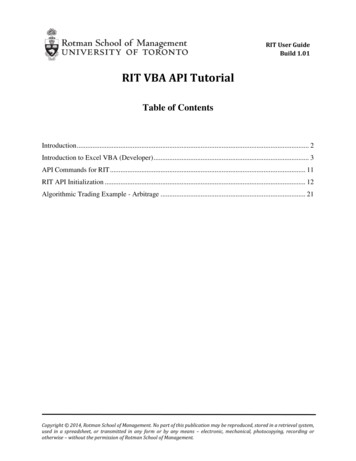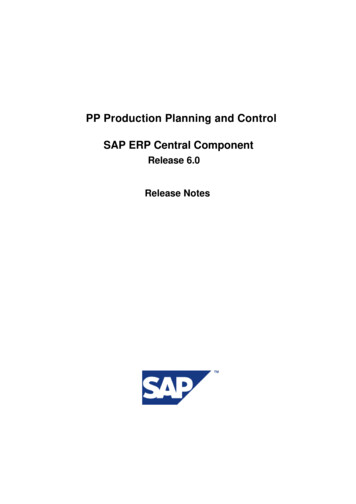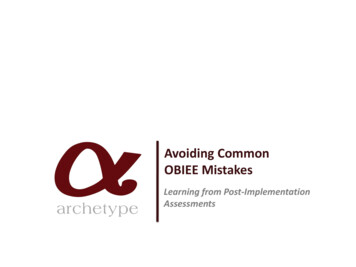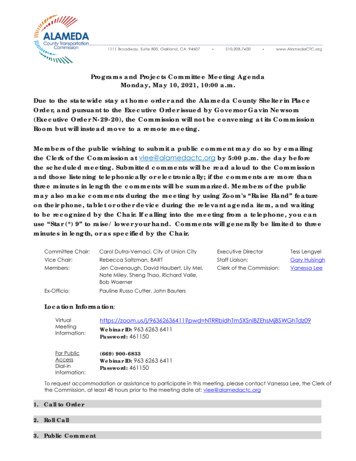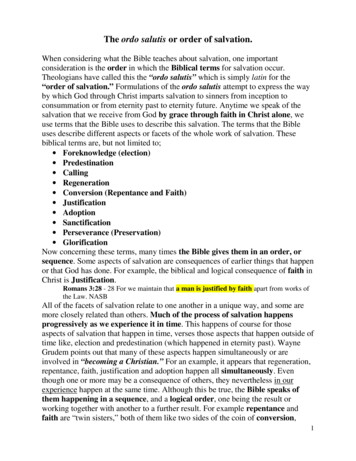
Transcription
The ordo salutis or order of salvation.When considering what the Bible teaches about salvation, one importantconsideration is the order in which the Biblical terms for salvation occur.Theologians have called this the “ordo salutis” which is simply latin for the“order of salvation.” Formulations of the ordo salutis attempt to express the wayby which God through Christ imparts salvation to sinners from inception toconsummation or from eternity past to eternity future. Anytime we speak of thesalvation that we receive from God by grace through faith in Christ alone, weuse terms that the Bible uses to describe this salvation. The terms that the Bibleuses describe different aspects or facets of the whole work of salvation. Thesebiblical terms are, but not limited to; Foreknowledge (election) Predestination Calling Regeneration Conversion (Repentance and Faith) Justification Adoption Sanctification Perseverance (Preservation) GlorificationNow concerning these terms, many times the Bible gives them in an order, orsequence. Some aspects of salvation are consequences of earlier things that happenor that God has done. For example, the biblical and logical consequence of faith inChrist is Justification.Romans 3:28 - 28 For we maintain that a man is justified by faith apart from works ofthe Law. NASBAll of the facets of salvation relate to one another in a unique way, and some aremore closely related than others. Much of the process of salvation happensprogressively as we experience it in time. This happens of course for thoseaspects of salvation that happen in time, verses those aspects that happen outside oftime like, election and predestination (which happened in eternity past). WayneGrudem points out that many of these aspects happen simultaneously or areinvolved in “becoming a Christian.” For an example, it appears that regeneration,repentance, faith, justification and adoption happen all simultaneously. Eventhough one or more may be a consequence of others, they nevertheless in ourexperience happen at the same time. Although this be true, the Bible speaks ofthem happening in a sequence, and a logical order, one being the result orworking together with another to a further result. For example repentance andfaith are “twin sisters,” both of them like two sides of the coin of conversion,1
since both are essential parts of converting or “becoming a Christian.” Anotherconsideration, pointed out by Bruce Demarest, is that the terms may “involve whatGod purposes or what he actually accomplishes and also may include things thatGod does or that humans do, or both. It may include things that are declarativeand instantaneous, or things that are experiential and progressive.” Well, to besure, salvation is a highly dynamic thing that God has written into the course ofredemptive history and His plan for the ages. John Murray comments, “So whenwe think about salvation we should not think of it as one simple indivisible act. Itcomprises a series of acts and processes.” I agree wholeheartedly, and the mostobvious reason is that Scripture presents salvation as a whole series of gloriousworks and acts of God that operate through the course of life to bring us into Hisglory and makes us sharers in His own very character and image. The glorious andwonderful works of God in salvation are not trifles, but treasures to be cherishedand lauded!Why should we consider the order of salvation?1) Because Scripture plainly presents both logical and chronologicalsequence and order to the events of salvation. It is important to considerthat if God speaks of these matters in this logical or chronological way, thesethings have happened according to God’s divine wisdom and by divineappointment. God has revealed these matters in this way for a specific andimportant reason.John 3:3-6 - 3 Jesus answered and said to him, "Truly, truly, I say to you, unless one isborn again, he cannot see the kingdom of God." 4 Nicodemus said to Him, "How cana man be born when he is old? He cannot enter a second time into his mother's womb andbe born, can he?" 5 Jesus answered, "Truly, truly, I say to you, unless one is born ofwater and the Spirit, he cannot enter into the kingdom of God. NASBSeeing and entering the Kingdom of God are results of regeneration. Themost elementary reading of this passage makes this clear. Let us see God’swisdom in arranging such matters this way to more fully display His glory.2) We experience them in a specific order in the succession of time. Someaspects are invisible and even mysterious, others are obvious and clearlyperceived. We may experience repentance and faith, these being obvious andperceptible, but these are simply the outworking or our calling andregeneration, which are unseen and mysterious.Acts 13:48 - 48 And when the Gentiles heard this, they began rejoicing and glorifying theword of the Lord; and as many as had been appointed to eternal life believed. NASBAs bright as the sun, appointment to eternal life (election) precedes faith.3) So that we can appreciate the beauty of the glory of God in saving grace.Each of the elements of salvation are expressed in concepts and biblicalwords which are specific and facets of the beauty of the gem of salvation2
which radiate the glory of God and His attributes. These aspects compel usto praise and thanksgiving for the benefit of His free grace to us in Christ.Ephesians 1:4-6 - 4 just as He chose us in Him before the foundation of the world, thatwe should be holy and blameless before Him. In love 5 He predestined us to adoptionas sons through Jesus Christ to Himself, according to the kind intention of His will, 6 tothe praise of the glory of His grace, which He freely bestowed on us in the Beloved. NASBYou see in this passage that election, sanctification, predestination, andadoption are all acts of God’s kindness designed by God for the glory ofGod’s grace to be praised by men and angels alike.4) So that we will grow in our knowledge and experience of God and Hissaving grace to us. As we grow in this knowledge we are further conformedinto the image of Christ and are progressively being transformed into Hislikeness.2 Corinthians 3:18 - 18 But we all, with unveiled face beholding as in a mirror the gloryof the Lord, are being transformed into the same image from glory to glory, just asfrom the Lord, the Spirit. NASBWhen Moses was read, the people were fearful so that he had to put a veil onhis face. But the veil has been lifted in Christ’s salvation, and the full gloryof salvation in the New Testament is beaming like the sun and revealing theglories of salvation in all its manifold works. This Paul says, istransforming us from one degree of glory to another!5) So that we can become a more effective disciplemaker and witness forChrist. The knowledge of salvation, its process and differing functions equipus to teach others about the greatness of it, and it motivates and equips us tobetter explain the Christian faith to the unbelieving.John 1:12-13 - 12 But as many as received Him, to them He gave the right to becomechildren of God, even to those who believe in His name, 13 who were born not ofblood, nor of the will of the flesh, nor of the will of man, but of God. NASBWho cannot see that adoption is the result of faith. The order here then isfaith, then adoption. Here is an example of a truth we learn and teach toothers, that God will adopt us into His family and treat us like His kids whenwe believe upon Christ. Thus a knowledge of salvation equips us to be betterwitnesses and disciplemakers.Now if these things be true, and God has arranged the great acts of salvation in alogical order and process, revealing each one is a sequence, let us not think thatwe can just mix them up any way we like. No rather we must learn the order andsequence according to the divine revelation to us, then we will know the truth inclarity and will be good students in the school of Christ. This intimate knowledgeof salvation will cause us to grow in our appreciation of God and all that He hasdone for us in Christ, and will in fact, increase our devotion and thanksgiving toHim in greater degree over time.3
With this background in mind let us briefly define what these terms mean in theircontext, and then we will be able to examine them in relation to one another in thecontext of Scripture.Foreknowledge (election)Now here we have what really is the very first and foundational element insalvation. It is God in eternity past willing salvation to happen for those whomHe chooses. This of course we call election. This is not to be confused with God’sknowing of all things from eternity, although it is related to that, in the context ofsalvation, foreknowledge is God’s deliberate setting of His electing love onthose whom He chooses, from eternity past. The Nelson’s Bible Dictionary makesthis simple and clear.FOREKNOWLEDGE- The unique knowledge of God which enables Him toknow all events, including the free acts of man, before they happen.God's foreknowledge is much more than foresight. God does not knowfuture events and the actions of men because He foresees them; He knows thembecause He wills them to happen (Job 14:5; Ps 139:15-16). Thus God'sforeknowledge is an act of His will (Isa 41:4; Rev 1:8,17; 21:6).In Rom 8:29 and 11:2, the apostle Paul's use of the word foreknew means"to choose" or "to set special affection on." The electing love of God, not foresightof human action, is the basis of His predestination and salvation (Rom 8:29-30,33).This same idea is used to express the nation of Israel's special relationship to God(Acts 2:23; Rom 11:2; 1 Peter 1:2,20).(from Nelson's Illustrated Bible Dictionary, Copyright 1986, Thomas Nelson Publishers)Now see the distinction between God knowing things beforehand (prescience), andGod’s deliberately acting to choose and set special affection upon beforehand(His willing and decreeing of them). This is clearly revealed in Scripture forexample with the nation of Israel, whom God chose to be His special people, andalso the Church whom Israel foreshadows in type. These are chosen to be God’sown people, a kingdom of priests unto God (1 Pet 2:9-10, Rev 1:6). To see thiseven more clearly, let us look at the passages where the word foreknowledge isused in the context of salvation.Romans 8:28-30 - 28 And we know that God causes all things to work together for goodto those who love God, to those who are called according to His purpose. 29 For whomHe foreknew, He also predestined to become conformed to the image of His Son, thatHe might be the first-born among many brethren; 30 and whom He predestined, theseHe also called; and whom He called, these He also justified; and whom He justified,these He also glorified. NASBSee here how calling, predestination, justification, and glorification are all acts ofGod’s will, and consequences of His foreknowledge. But here God foreknows,4
that is deliberately acts in His eternal counsel to bring about calling, predestination,justification, and glorification. God had a purpose in calling us (v-28), that is tosave us (v-29-30). That salvation of us is called in this passage by five(foreknowledge, predestination, calling, justification, and glorification ) differentlogically ordered terms, given in a sequence. Now all of these fall out in thesequence of time beginning with foreknowledge and ending in glorification.Here it is abundantly clear that foreknowledge is the first and foundationalelement, which brings about the others, ending in the consummation of hispurpose, glorification with Him. This also is an obvious key from the knowledgeof God, things happen not because God knows them, but because He wills them tohappen, His decree. Therefore, all of these savings acts, are acts of God’s willbeginning with the willing itself which is here called foreknowledge.Let’s also consider Romans 11:1-4.Romans 11:1-4 - 11 I say then, God has not rejected His people, has He? May it neverbe! For I too am an Israelite, a descendant of Abraham, of the tribe of Benjamin. 2 Godhas not rejected His people whom He foreknew. Or do you not know what theScripture says in the passage about Elijah, how he pleads with God against Israel? 3"Lord, they have killed Thy prophets, they have torn down Thine altars, and I alone amleft, and they are seeking my life." 4 But what is the divine response to him? "I havekept for Myself seven thousand men who have not bowed the knee to Baal." NASBHere again Paul speaks of God’s willing in His eternal counsel to know a people,that is to set His special electing love upon them. Consider how Deuteronomymakes God’s fore-loving, or foreknowledge of Israel crystal clear. Moreover, theconsequences of His willing in His eternal counsel coming to pass in a realsalvation in the course of history.Deuteronomy 4:32-40 - 32 "Indeed, ask now concerning the former days which werebefore you, since the day that God created man on the earth, and inquire from one endof the heavens to the other. Has anything been done like this great thing, or hasanything been heard like it? 33 "Has any people heard the voice of God speaking fromthe midst of the fire, as you have heard it, and survived? 34 "Or has a god tried to go totake for himself a nation from within another nation by trials, by signs and wondersand by war and by a mighty hand and by an outstretched arm and by great terrors,as the Lord your God did for you in Egypt before your eyes? 35 "To you it was shownthat you might know that the Lord, He is God; there is no other besides Him. 36 Outof the heavens He let you hear His voice to discipline you; and on earth He let you seeHis great fire, and you heard His words from the midst of the fire. 37 Because He lovedyour fathers, therefore He chose their descendants after them. And He personallybrought you from Egypt by His great power, 38 driving out from before you nationsgreater and mightier than you, to bring you in and to give you their land for aninheritance, as it is today. 39 Know therefore today, and take it to your heart, that theLord, He is God in heaven above and on the earth below; there is no other. NASBDeuteronomy 7:7-9 – 7 The Lord did not set His love on you nor choose you becauseyou were more in number than any of the peoples, for you were the fewest of allpeoples, 8 but because the Lord loved you and kept the oath which He swore to your5
forefathers, the Lord brought you out by a mighty hand, and redeemed you from thehouse of slavery, from the hand of Pharaoh king of Egypt. NASBSee then, how this foreknowledge is much more than just “prescience”, (that’s isto know before), but an act of God’s will to deliberately love a specific people.This word foreknowledge is never used of the wicked and unbelieving in theBible, it is reserved only for God’s special electing love that motivates the savingsacts He performs for His own people. Consider also, 1 Peter 1:1-2;1 Peter 1:1-2 - 1 Peter, an apostle of Jesus Christ, to those who reside as aliens, scatteredthroughout Pontus, Galatia, Cappadocia, Asia, and Bithynia, who are chosen 2according to the foreknowledge of God the Father, by the sanctifying work of theSpirit, that you may obey Jesus Christ and be sprinkled with His blood: May grace andpeace be yours in fullest measure. NASBSee again hear, the Christians to whom Peter is writing are referred to as “chosenaccording to the foreknowledge of God the Father.” The word “chosen” here isthe Greek “eklektos,” simply meaning “elect” or “chosen.” They are the oneswhom He is also “sanctifying” by the “work of the Spirit.” These are said to bechosen for “obedience” to Jesus Christ. In the context of our study, we should justnote here that, election happens according to foreknowledge, a word we havebriefly discussed in other passages in the New Testament meaning God’s willingbeforehand to love, or to set His love upon. See then that foreknowledge is actuallythe first element in election, God’s willing before hand upon certain individualsthat He then chooses, or if you will, His forewilling to love is His choosing, thusPeter’s remark, “chosen according to the foreknowledge of God the Father.”Now as we consider the order of salvation, let us say here that there is no part of itthat comes before the eternal counsel of God, His eternal knowledge of whom Hechooses to save. That is why we have stated that this is the very first andfoundational element in salvation. It is God in eternity past willing salvation tohappen for those whom He chooses. This of course we call election. See then it isalways first in the ordo salutis.ElectionNow before moving on let us just briefly comment on the teaching of election togive a little more background in understanding this term, and some Scripture incontext. Note here a few important things about election that are importantelements in it. Bruce Demarest makes these helpful observations;1) Election is according to God’s sovereign will and good pleasure. It involvesGod’s unconditional choice of a man or woman, the latter’s choice of God.2) Election is an act of free grace. God is not obligated to save a singlerebellious sinner.3) Election is not based on foreseen faith, works or holiness. Although Godknows all things in advance, foreknowledge is an act of God’s will to save6
specific persons, from before the beginning of time, saving which Heinitiates in the course of history in calling and regeneration, resulting infaith.4) Election is absolutely certain as to its outcome. Since the omnipotent Godinfallibly accomplishes His purposes, all the elect will be saved.The concept of election is taught throughout the New Testament by Jesus, Luke,Paul, Peter and John. It appears in various contexts and many times appears in anordered way along with other important elements in salvation. Here are a few;Matthew 11:27 - 27 "All things have been handed over to Me by My Father; and no oneknows the Son, except the Father; nor does anyone know the Father, except the Son,and anyone to whom the Son wills to reveal Him.John 15:16 - 16 "You did not choose Me, but I chose you, and appointed you, that youshould go and bear fruit, and that your fruit should remain, that whatever you ask of theFather in My name, He may give to you. NASBSee here that Jesus Himself is seen as the electing agent, according to His ownwill, and not based on anything in the one chosen, it is unconditional.Ephesians 1:3-6 - 4 just as He chose us in Him before the foundation of the world,that we should be holy and blameless before Him. In love 5 He predestined us toadoption as sons through Jesus Christ to Himself, according to the kind intention of Hiswill, 6 to the praise of the glory of His grace, which He freely bestowed on us in theBeloved. NASBSee here that the election takes place “before the foundation of the world.” Thewhen of election could not be clearer. But notice also election is, “to holiness, inlove, for son-ship to Himself, through Jesus, according to His kindness, to thepraise of the glory of His grace.” Wow, what a compounding of beautifulrealities about God’s choice of us! Notice also, 2 Timothy 1:9-11;2 Timothy 1:9-11- 9 who has saved us, and called us with a holy calling, not accordingto our works, but according to His own purpose and grace which was granted us inChrist Jesus from all eternity, 10 but now has been revealed by the appearing of ourSavior Christ Jesus, who abolished death, and brought life and immortality to lightthrough the gospel, NASBHere we see that salvation is “not according to our works, but according to Hisown purpose and grace.” Salvation is granted “from all eternity” and not basedon foreseen works, but is an act of God’s free grace as God is not obligated tosinners in any way to save them, but wills freely to save them while they are yetsinners in rebellion against Him (Rom 5:-8-10).Acts 13:48 - 48 And when the Gentiles heard this, they began rejoicing and glorifying theword of the Lord; and as many as had been appointed to eternal life believed. NASBSee here that faith is seen many times as the consequence of election, not theother way around. Foreseen faith is never spoken of as the preceding God’s choiceor a reason for it. Those who are “appointed” in eternity to eternal life are thosewho consequently “believe.” Election is not based on foreseen faith, works orholiness.7
John 6:39 - 39 "And this is the will of Him who sent Me, that of all that He has givenMe I lose nothing, but raise it up on the last day. NASBLastly, consider here that all the elect will be saved. Election is always certain asto its outcome. Of “all that He has given me I lose nothing, but raise it up onthe last day.” Notice the order here, election and then glorification. All the electwill be glorified, indeed none that the Father has given to the Son will perish, butwill indeed be raised in glory at the last Day (1 Cor 15:40-49, Phil 3:20-21).Predestination“Predestination” is a Biblical word which refers to the fact that God has set thedestiny of His chosen people from before the beginning of time. This is presentedin many places in Scripture.In Acts, we read about an “appointment” to eternal life which results in faith.Acts 13:48 - 48 And when the Gentiles heard this, they began rejoicing and glorifying theword of the Lord; and as many as had been appointed to eternal life believed. NASBIn 1 Corinthians it used to speak about God’s purpose to deliver us to future glory.1 Corinthians 2:6-9 - 6 Yet we do speak wisdom among those who are mature; awisdom, however, not of this age, nor of the rulers of this age, who are passing away; 7but we speak God's wisdom in a mystery, the hidden wisdom, which God predestinedbefore the ages to our glory; 8 the wisdom which none of the rulers of this age hasunderstood; for if they had understood it, they would not have crucified the Lord of glory;9 but just as it is written, "Things which eye has not seen and ear has not heard, Andwhich have not entered the heart of man, All that God has prepared for those who loveHim." NASBIn Romans we read that salvation occurs “to those who are called according toHis purpose.” Paul reasons then from election, that God predestines, calls,justifies, and glorifies finally. Here the destination of the predestination is that weshould be “conformed to the image of His Son,” an obvious reference to ourfuture glory.Romans 8:28-30 - 28 And we know that God causes all things to work together for goodto those who love God, to those who are called according to His purpose. 29 Forwhom He foreknew, He also predestined to become conformed to the image of HisSon, that He might be the first-born among many brethren; 30 and whom Hepredestined, these He also called; and whom He called, these He also justified; andwhom He justified, these He also glorified. NASBSee in these verses God working everything after a predetermined purpose, whichresults in glory. God has “predestined” His people unto final glory. Thispredestination is spoken of as God’s “preparing beforehand for glory,” thosewhom He “calls.”Romans 9:22-25 - 22 What if God, although willing to demonstrate His wrath and tomake His power known, endured with much patience vessels of wrath prepared fordestruction? 23 And He did so in order that He might make known the riches of His gloryupon vessels of mercy, which He prepared beforehand for glory, 24 even us, whomHe also called, not from among Jews only, but also from among Gentiles. NASB8
In Ephesians we are said to be “predestined” unto “adoption as sons,” havingbeen chosen “from before the foundation of the world.” See here the exactmeaning of predestination, it is God willing in eternity past for a certain futuredestiny (to destine) from before (pre). This is again tied to the glory of God asPaul explains that He predestined us for a purpose, and the destination of thepredestination is the “praise of the glory of His grace.”Ephesians 1:4-6, 11-14,18 - 4 just as He chose us in Him before the foundation of theworld, that we should be holy and blameless before Him. In love 5 He predestined us toadoption as sons through Jesus Christ to Himself, according to the kind intention of Hiswill, 6 to the praise of the glory of His grace, which He freely bestowed on us in theBeloved. NASBEphesians 1:11 - In Him 11 also we have obtained an inheritance, having beenpredestined according to His purpose who works all things after the counsel of Hiswill, 12 to the end that we who were the first to hope in Christ should be to the praiseof His glory. NASBIt is also used in Acts to speak about God’s predestined purpose for Christ to becrucified at the hands of sinful men in order to accomplish His “predeterminedplan.”Acts 2:22-23 - 22 "Men of Israel, listen to these words: Jesus the Nazarene, a manattested to you by God with miracles and wonders and signs which God performedthrough Him in your midst, just as you yourselves know — 23 this Man, delivered upby the predetermined plan and foreknowledge of God, you nailed to a cross by thehands of godless men and put Him to death. NASBActs 4:27-28 - 27 "For truly in this city there were gathered together against Thy holyservant Jesus, whom Thou didst anoint, both Herod and Pontius Pilate, along with theGentiles and the peoples of Israel, 28 to do whatever Thy hand and Thy purposepredestined to occur. NASBSee then the Bible clearly setting forth the idea of God willing in eternity past,according to a specific purpose, the destiny of creatures in time and space, andspecifically willing salvation to happen for His elect people.Easton’s Bible Dictionary gives a succinct definition of Predestination.PREDESTINATION - This word is properly used only with reference toGod's plan or purpose of salvation. The Greek word rendered "predestinate"is found only in these six passages, Acts 4:28; Rom 8:29,30; 1 Cor 2:7;Eph 1:5,11; and in all of them it has the same meaning. They teach that theeternal, sovereign, immutable, and unconditional decree or "determinatepurpose" of God governs all events. (from Easton's Bible Dictionary. Allrights reserved.)CallingSalvation is actually a supernatural work of God which is accomplished by theregenerating work of the Holy Spirit. This is because mankind has a NaturalInability to see, hear or even understand the Gospel. More than this, God9
unconditionally elects those who will be saved, and He does this from before thebeginning of time, as we have seen in Foreknowledge, Election, andPredestination. This is to say that election is not conditioned upon any response inman but happens because of the free electing grace of God. People get saved intime and space, because God has chosen them in eternity past and regenerates themin the course of their life.John 3:3 - 3 Jesus answered and said to him, "Truly, truly, I say to you, unless one isborn again, he cannot see the kingdom of God." NASB2 Thessalonians 2:13 - 13 But we should always give thanks to God for you, brethrenbeloved by the Lord, because God has chosen you from the beginning for salvationthrough sanctification by the Spirit and faith in the truth. NASBTherefore it is necessary, since Salvation is a supernatural work which is initiatedby God in election and brought to pass by the new birth, that the outworking of thiselection have, some point in time and space when it comes to fruition(Regeneration). Not only this, but when speaking of the Church and those who arethe recipients of salvation, the Bible plainly declares that they are “called” by Himat some point in their life. This obviously gives light to the fact that God is theinitiator in the process of salvation.Romans 8:28 - 28 And we know that God causes all things to work together for good tothose who love God, to those who are called according to His purpose. NASBRomans 1:5-7 - 5 through whom we have received grace and apostleship to bring aboutthe obedience of faith among all the Gentiles, for His name's sake, 6 among whom youalso are the called of Jesus Christ; 7 to all who are beloved of God in Rome, called assaints: Grace to you and peace from God our Father and the Lord Jesus Christ. NASBRomans 9:23-24 - 23 And He did so in order that He might make known the riches ofHis glory upon vessels of mercy, which He prepared beforehand for glory, 24 even us,whom He also called , not from among Jews only, but also from among Gentiles. NASB1 Corinthians 1:9 - 9 God is faithful, through whom you were called into fellowshipwith His Son, Jesus Christ our Lord. NASB1 Corinthians 1:23-24 - 23 but we preach Christ crucified, to Jews a stumbling block,and to Gentiles foolishness, 24 but to those who are the called, both Jews and Greeks,Christ the power of God and the wisdom of God. NASB2 Thessalonians 2:14 - 14 And it was for this He called you through our gospel, thatyou may gain the glory of our Lord Jesus Christ. NASB1 Timothy 6:12 - 12 Fight the good fight of faith; take hold of the eternal life to whichyou were called, and you made the good confession in the presence of many witnesses.NASB2 Timothy 1:9 - 9 who has saved us, and called us with a holy calling, not according toour works, but according to His own purpose and grace which was granted us in ChristJesus from all eternity, NASBHebrews 9:15 - 15 And for this reason He is the mediator of a new covenant, in orderthat since a death has taken place for the redemption of the transgressions that werecommitted under the first covenant, those who have been called may receive thepromise of the eternal inheritance. NASB10
1 Peter 5:10 - 10 And after you have suffered for a little while, the God of all grace, whocalled you to His eternal glory in Christ, will Himself perfect, confirm, strengthen andestablish you. NASBAnd more than this, our salvation is spoken of as a “calling” by God. This speaksof a divine favor or privilege which has been given to all the saints.Romans 11:28-29 - 28 From the standpoint of the gospel they are enemies for your sake,but from the sta
The ordo salutis or order of salvation. When considering what the Bible teaches about salvation, one important consideration is the order in which the Biblical terms for salvation occur. Theologians have called this the “ordo salutis” which is simply latin for the “order of salvation.

